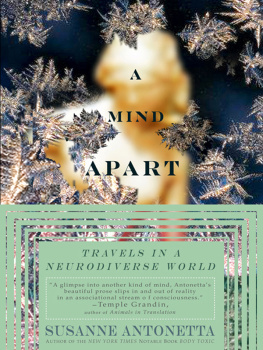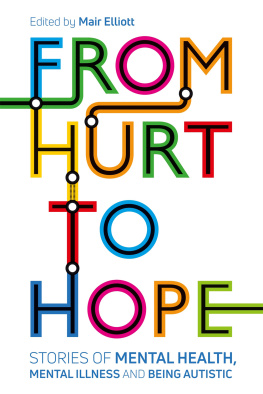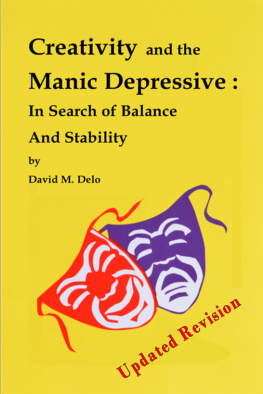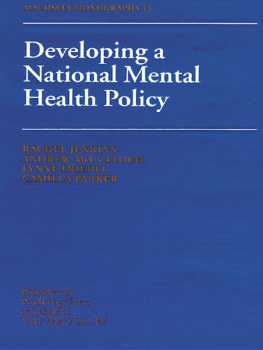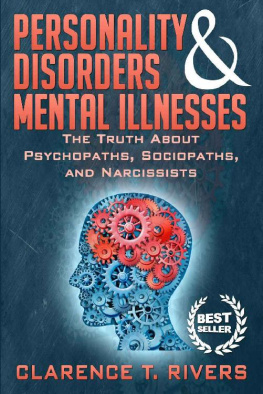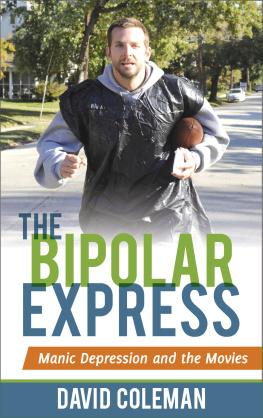S USANNE A NTONETTA
A M IND A PART
Travels in a
Neurodiverse World
J EREMY P. T ARCHER /P ENGUIN
a member of Penguin Group (USA) Inc. New York
JEREMY P. TARCHER/PENGUIN
Published by the Penguin Group
Penguin Group (USA) Inc., 375 Hudson Street, New York, New York 10014, USA Penguin Group (Canada), 90 Eglinton Avenue East, Suite 700, Toronto, Ontario M4P 2Y3, Canada (a division of Pearson Penguin Canada Inc.) Penguin Books Ltd, 80 Strand, London WC2R 0RL, England Penguin Ireland, 25 St Stephens Green, Dublin 2, Ireland (a division of Penguin Books Ltd) Penguin Group (Australia), 250 Camberwell Road, Camberwell, Victoria 3124, Australia (a division of Pearson Australia Group Pty Ltd) Penguin Books India Pvt Ltd, 11 Community Centre, Panchsheel Park, New Delhi110 017, India Penguin Group (NZ), 67 Apollo Drive, Rosedale, North Shore 0745, Auckland, New Zealand (a division of Pearson New Zealand Ltd) Penguin Books (South Africa) (Pty) Ltd, 24 Sturdee Avenue, Rosebank, Johannesburg 2196, South Africa
Penguin Books Ltd, Registered Offices:
80 Strand, London WC2R 0RL, England
Copyright 2005 by Suzanne Paola
All rights reserved. No part of this book may be reproduced, scanned, or distributed in any printed or electronic form without permission. Please do not participate in or encourage piracy of copyrighted materials in violation of the authors rights. Purchase only authorized editions.
The Library of Congress catalogued the hardcover edition as follows:
Antonetta, Susanne, date.
A mind apart: travels in a neurodiverse world/Susanne Antonetta.
p. cm.
ISBN: 978-1-1012-1595-1
1. Psychology, Pathological. I. Title.
RC454.A429 2005 2005050654
616.89dc22
While the author has made every effort to provide accurate telephone numbers and Internet addresses at the time of publication, neither the publisher nor the author assumes any responsibility for errors, or for changes that occur after publication. Further, the publisher does not have any control over and does not assume any responsibility for author or third-party websites or their content.
For Bruce and Jin, neurodivine
How many ways, on how many levels, do we discover the inaccessibility of another mind?
C ZESLAW M ILOSZ
The Land of Ulro
What a piece of work is a man, How noble in reason
W ILLIAM S HAKESPEARE
Hamlet
A MIND APART
PROLOGUE
I AM ASKED, What is this book. And I want to say, Books are like children. They are what they are because they are not something else.
But children have their genesismoments of love, insight, passion, transgressionand so do books. When I first came across the concept of neurodiversity, I felt a thrill of recognition: I found the term in a quote from autistic Temple Grandin, used to mean people hardwired to think differently from the norm. I have manic-depressive disorder, and one of the major changes my life has charted has been, oddly enough, just having people I can talk to. Really talk. Of the people Im closest to, at a little past the midpoint of my life, one has the form of autism known as Aspergers syndrome. One has multiple personalities, and sends me messages like I am Peggys sister. I have a million secrets. Will you be my friend?
Dawn, the friend with Aspergers, found human society difficult until learning to exist with gorillas, whom she got to know by falling in love with them, taking a small zoo job, and going on to become a primatologist. Her first sense of the magic of connection came when a gorilla touched her on the finger.
I e-mail NLiliwhos a many-head, or man with different people inside himup to three or four times a day. They are married to my cousin. I write them separately and together: in response they might say THIS IS US or THIS IS VICKI or ANNIE ASKED ME TO ASK YOU SOMETHING LOVE PEG. WE ARE CHILDREN, they say, though they live in an adult male body.
Even those I meet who dont have a syndrome you could find in the DSM-IV, the manual doctors use to assign disorders of the mind, reveal to me inner lives of honeycomb intricacy, bitterness and sweetness: judges chambers, elevators inside. Animals, the more we insert ourselves into their consciousnesses, reflect back startling strangenesses and familiarities: song as language, painting as personal expression. This is a book about different kinds of minds.
LAST WEEK for two days I couldnt read: I ended up holding books in front of my face as if they were fans. I wanted to read, and my books had charm for me, but the words slid off the page or stuck, gnarls in a river. I couldnt read because I had word aversions, to several words I cant type even now or think about, unless in my mind I scramble them. One is a word that appears in recipes, so I couldnt read recipes or look at cookbooks. The aversion seemed to stem from two consonants in a certain order. Come to think of it, I also couldnt read because of word infatuations: when my eye got to certain words I love smooth and lush, for instanceI would have to slow and caress them. After a while I realized my eye wasnt going anywhere but stayed stuck, like a needle in a groove. There it is. Here I jog it along.
Anyway, I have bipolar disorder and have to tolerate lots of odd, unruly things happening in my head. The reading problem got so annoying I wrote to my friend Dawn. I wondered if she ever felt the same thing, and she wrote back,
Virtually every word I hear or see is onomatopoetic (sp?) to me. I cant stand the word stimulation (and it is even worse when e-mail groups shorten it, as many of my autistic acquaintances do, to stim. AAHHHHHH!!!!!) Its like nails on a chalkboardit even makes my face hurt. Probably because it forms a feedback loop in my brain and becomes what the word describes. Luckily, I have words like cream and foam to balm the ache.
We talk like this a lot. Do you feel the number five is brown? Can you hold it when it comes to you, unassuming in its brownness? How does everyone resist the lusciousness of others minds, moving around us, with us, all the time, like a gallery of veiled art?
Not in itself indeed; it is a trifle unworthy your exalted rank. Buton account of the author, who is the first being of the kind, and yet without a name.
He was once a man.
Simon Brown, a clergyman, described himself this way in a letter to Queen Caroline of England. He dedicated his defense of Christianity to her. The Defense became a widely loved work, though at the time he wrote it, the author claimed his soul had been sucked from his body, leaving him a brute or a husk.
IN A RECENT BACK ISSUE of The Atlantic I found an article titled Neurodiversity. Not only was the subject there but the piece was dated the date after my birthday, which, possibly because of my neurodiverse way of thinking, led me to attach all kinds of importance to it. A short piece, it brought together two other pieces of writingJon Katzs GeekForce columns in the e-zine HotWired, and a website called the Institute for the Study of the Neurologically Typical. The site borrows the language of autism literature, offering diagnostic screenings for neurotypicality, online papers, and diagnostic criteria like Neurotypical syndrome is a neurobiological disorder characterized by preoccupation with social concerns, delusions of superiority, and obsession with conformity.
Katzs GeekForce columns, on the rise of geekdom as an epic social movement, dont mention the neuroatypical, but Katz discusses the geeks in the computer age as the socially clueless become cool, and the author of the Atlantic article, Harvey Blume, refers readers to the Institute site if they want to understand the possible neurological underpinnings of GeekForce. One of the site creators symptoms of neurotypicality is technology trouble. Often, nonautistics see wholes; autistics are more likely to see parts, which can make them more adept with computers. The Comments section of the Institute website, in between speculations that neuroatypicals may be the next step in human evolution, includes lots of vents at the neurotypicals fumbling around with computers or VCRs.

